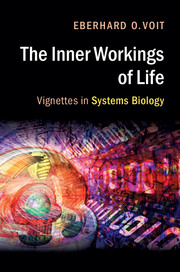Book contents
- Frontmatter
- Contents
- Appetizer
- Acknowledgments
- 1 Status: it's complicated!
- 2 I'd rather be fishin’
- 3 Whizzes and apparitions
- 4 Why?
- 5 Simply engenious!
- 6 Just a little bit
- 7 Supermodels
- 8 Close only counts in horseshoes and hand grenades
- 9 Emergence preparedness
- 10 Life without chaos?
- 11 What hath God wrought!
- 12 Tell me with whom you go and I'll tell you who you are
- 13 Time for a change!
- 14 Can't we all get along?
- 15 Love thyself and fight all others
- 16 A billion dollars for your thoughts!
- 17 The computer will see you now…
- 18 Redesigning perfect
- 19 Let's meet in the agorá!
- 20 Dessert
- Gentle jargon
- Selected further reading
- Index
14 - Can't we all get along?
Published online by Cambridge University Press: 05 May 2016
- Frontmatter
- Contents
- Appetizer
- Acknowledgments
- 1 Status: it's complicated!
- 2 I'd rather be fishin’
- 3 Whizzes and apparitions
- 4 Why?
- 5 Simply engenious!
- 6 Just a little bit
- 7 Supermodels
- 8 Close only counts in horseshoes and hand grenades
- 9 Emergence preparedness
- 10 Life without chaos?
- 11 What hath God wrought!
- 12 Tell me with whom you go and I'll tell you who you are
- 13 Time for a change!
- 14 Can't we all get along?
- 15 Love thyself and fight all others
- 16 A billion dollars for your thoughts!
- 17 The computer will see you now…
- 18 Redesigning perfect
- 19 Let's meet in the agorá!
- 20 Dessert
- Gentle jargon
- Selected further reading
- Index
Summary
It has almost become a cliché. One African-American, one Asian, one Caucasian, one Hispanic, one Mid-Eastern and one Native American child are all playing cheerfully together, while advertising a new gadget or the best detergent of all time. And, of course, the group consists of three girls and three boys. The picture displays an idealized world we all want to see: peaceful, harmonic diversity. We are not just all equal before the law; if we set our mind to it, we can all get along just fine, in spite of our differences. In fact, we believe that diversity expands and enriches what we as a community can accomplish.
In nature, diversity takes on a dimension of an entirely different magnitude, and a few little Homo sapiens of different hues playing together are just that: child's play. A long-term investigation of a lake in Wisconsin identified roughly 10,000 different species of bacteria, all living together in what modern lingo calls a metapopulation or a microbiome. According to some estimates, a single liter of ocean water can contain 10 billion viruses; that is more than one virus per person in the entire world. These populations of populations can be found in essentially any place where life can thrive. They live in oceans, lakes, and rivers, below and above ground, as well as in and on plants and animals. A single gram of soil can contain enough microbial DNA to stretch almost 1,000 miles. Some microbial metapopulations form biofilms, which are thin layers on moist surfaces and in all kinds of pipes, sewage systems, and water tubing that one might find in less than sanitary dentists’ offices, and even on our teeth. All in all, it has been estimated that 5x1030 prokaryotic cells inhabit the earth – that is a 5 with 30 zeroes – and very few live in a monoculture.
Whether we are looking at the macro- or micro-world, no organism thrives in isolation, and the coexistence of many species indicates that complex communities have evolved together in a dynamic and adaptive combination of genomic and ecological processes. The human body is no exception. It serves as the host to an estimated 100 trillion microbes, a number that corresponds to roughly 10 times the total number of human cells in the body. Particularly fertile is the gut, where the density of microorganisms can reach 1 trillion cells per milliliter.
- Type
- Chapter
- Information
- The Inner Workings of LifeVignettes in Systems Biology, pp. 109 - 116Publisher: Cambridge University PressPrint publication year: 2016



